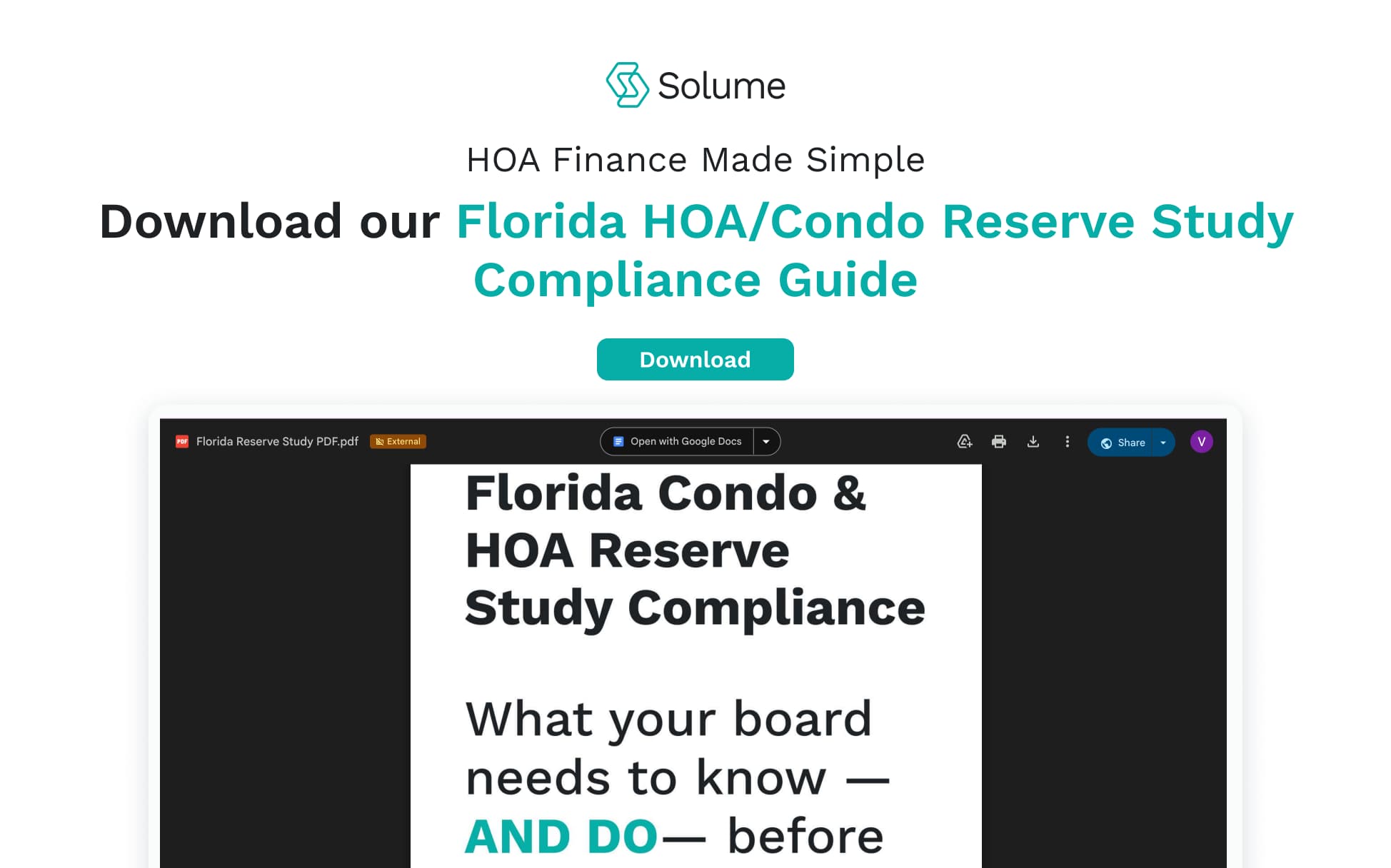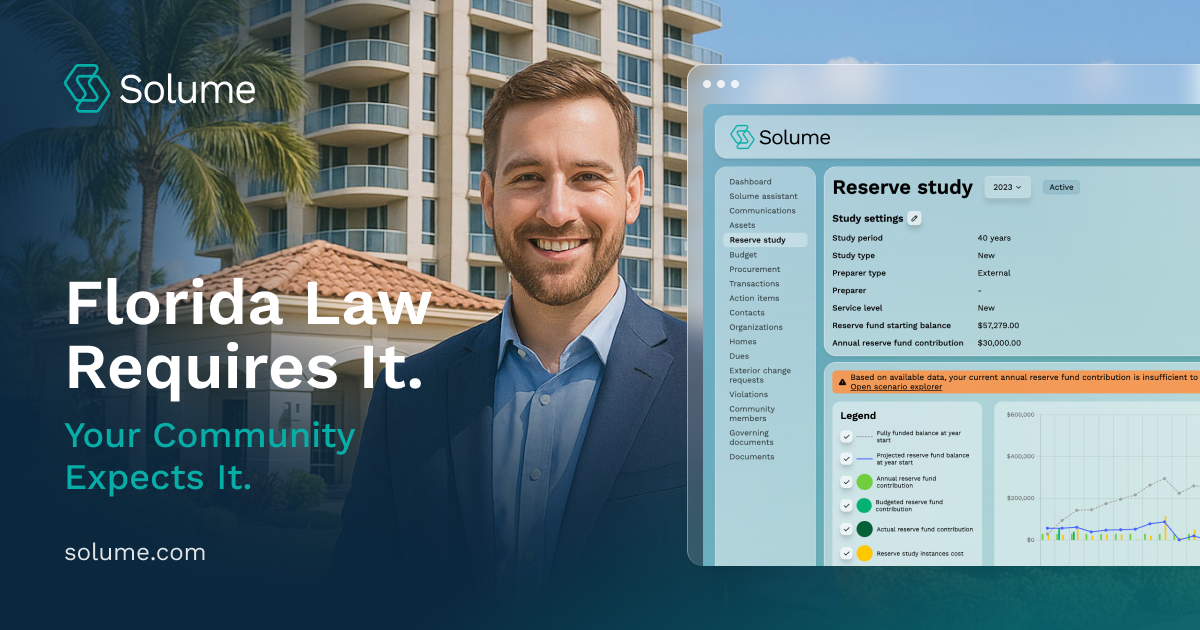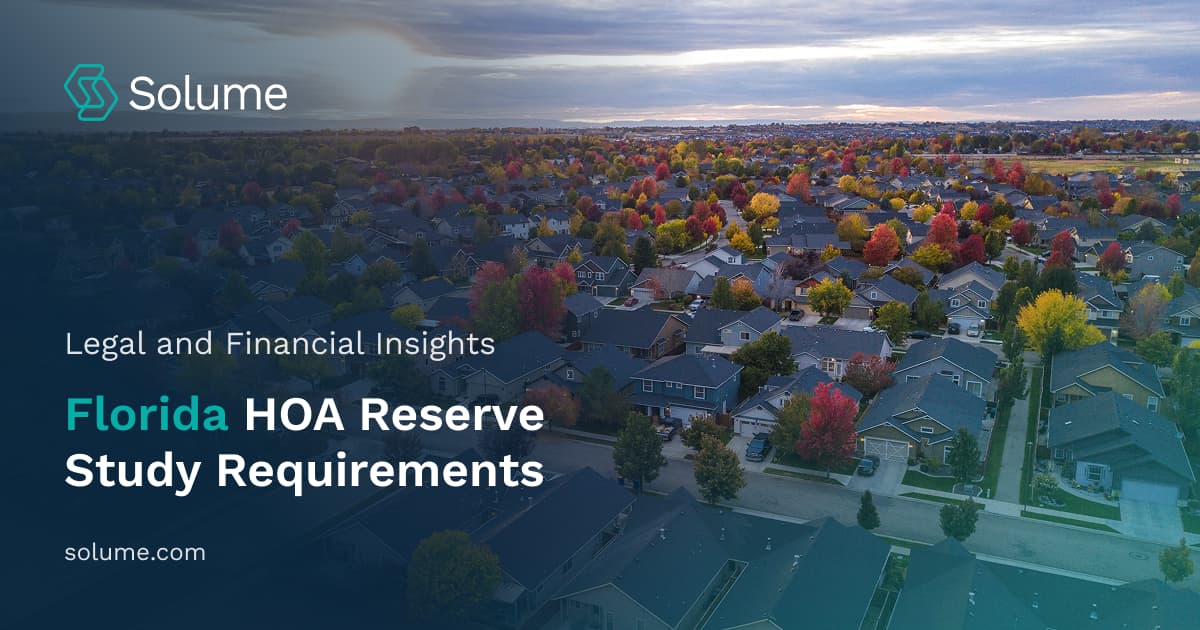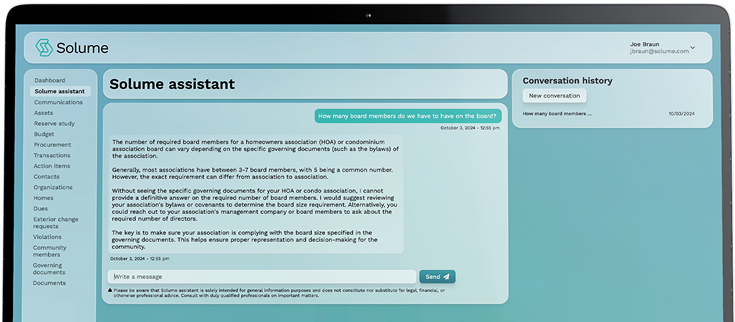Key Takeaways
- Florida law now requires Structural Integrity Reserve Studies (SIRS) for most condos three stories or higher, with the first studies due by December 31, 2025.
- Reserve studies protect communities from deferred maintenance, special assessments, and loss of property value.
- Understanding Chapter 718 and HB 913 is essential for compliance and long-term financial health.
- Boards that integrate their reserve studies into daily management—rather than treat them as a one-time report—stay compliant, transparent, and financially stable.

What Are Florida HOA Reserve Study Requirements?
Defining an HOA Reserve Study
A reserve study is a financial planning tool that helps associations prepare for the repair or replacement of common elements. It identifies major components—roofs, plumbing, waterproofing, pavement, and structural systems—and estimates their remaining useful life and replacement cost. The goal is simple: fund reserves now to prevent a financial crisis later.
A Reserve Specialist or licensed engineer typically conducts the study, combining a visual inspection with financial analysis. The outcome is a roadmap that guides the board of directors on how much to contribute to reserves annually. It’s part budgeting, part insurance policy for the community’s future.
Legal Requirements Under Florida Statutes
All condo associations with buildings three stories or higher must complete a Structural Integrity Reserve Study (SIRS) by December 31, 2025 (under Chapter 718 of the Florida Statutes and amended by HB 913). This requirement was extended from the original 2024 deadline to give associations more time to comply.
Florida law now requires that reserve studies cover the parts of a building that keep it safe and standing—things like the roof, load-bearing walls, foundation, floors, fire protection, plumbing, electrical, and waterproofing. These are no longer optional line items in a budget. Boards can’t vote to skip or underfund them because they directly impact a building’s structural integrity and the safety of everyone who lives there.
Failing to comply can expose board members to legal risk, civil penalties, and potential breach of fiduciary duty claims. SIRS is not optional—it’s a safeguard written into Florida Statutes to prevent another Surfside-level disaster.
Why Reserve Studies Are Crucial for Florida HOAs
Protecting Property Values and Structural Integrity
Reserve studies aren’t just a checkbox to get a thick PDF; they literally protect the structure and your liability. They exist so communities don’t wake up one day facing crumbling concrete or failing waterproofing. When boards overlook structural pieces like load-bearing walls, balconies, or sealing systems, small cracks turn into big bills. Deferred maintenance eventually becomes damage, and damage becomes disaster.
You don’t have to look far to see why this matters. In 2021, the Surfside condominium collapse killed 98 people and devastated an entire community. Investigations later showed that years of neglected repairs and underfunded reserves played a major role. Florida’s new SIRS requirements were created to keep that kind of tragedy from happening again.
Boards that take their reserve studies seriously protect both property values and people. They’re the ones who keep communities stable, homes marketable, and neighbors confident that their buildings are safe.
Financial Health and Avoiding Special Assessments
Underfunded reserves lead to one outcome: special assessments. (Well, that's only partly true... it can lead to ugly communities or to actual disasters over time). These sudden, mandatory charges blindside owners, create resentment, and drive financial instability. A solid reserve study prevents that.
A healthy funding plan allows associations to:
- Build adequate reserves gradually instead of relying on emergency assessments.
- Spread repair costs over time, aligning expenses with long-term planning.
- Maintain steady dues increases instead of unpredictable spikes.
A 2022 study by the Association Reserves found that Florida associations with fully funded reserves were three times less likely to levy special assessments than those with underfunded reserves. In short: fund reserves now or pay exponentially more later.

Key Elements of a Florida HOA Reserve Study
Inspections and Reserve Analysis
A professional reserve study begins with a site inspection. Engineers or reserve specialists conduct a visual inspection of all major components, identifying wear and tear, deferred maintenance expense, and estimating remaining useful life. They then calculate estimated replacement costs and build a reserve funding plan that supports the association’s annual budget and long-term capital expenditures.
Milestone Inspections may also be required for certain buildings under state law, and those findings should feed into the reserve analysis. Together, these inspections create a comprehensive picture of the community’s financial and structural health.
Important Reserve Items and Common Elements
A Structural Integrity Reserve Study needs to list the systems that keep a building safe and functional over time. Think of it as a record of the pieces that (literally) hold a community together. Typical items include:
- Roof replacement and waterproofing systems
- Load-bearing walls and structural foundations
- Electrical systems and fire protection systems
- Plumbing, elevators, and pavement resurfacing
- Building painting and other deferred maintenance expenses
These common elements form the foundation of a compliant SIRS. Leaving one out is not just a financial mistake—it’s a legal one.
Best Practices for HOA Reserve Planning in Florida
Working with Professionals
Boards should engage qualified professionals—licensed engineers, Reserve Specialists, or reputable reserve study companies. They provide not just technical expertise but documentation that demonstrates legal compliance under Florida Statutes.
Property managers also play a key role. They help maintain the association’s financial stability by implementing the study’s recommendations, tracking expenses, and preparing for reserve study updates. Reserve planning isn’t one-and-done—it’s a living process that evolves each fiscal year.
Solume takes the traditional reserve study and turns it into a dynamic, interactive platform. Instead of flipping through PDFs to find when a roof needs replacement or when dues should increase, Solume allows boards to model different funding strategies in real time. It connects your annual budget, reserve contributions, and capital expenditures into one transparent system.
Engaging HOA Boards and Members
Transparency is compliance. The board of directors should involve members early, explaining how reserve requirements protect everyone’s investment. Key votes—like approving reserve contributions—should be conducted with clear disclosure and legal advice when needed.
Boards that communicate openly avoid backlash and build trust. When members understand the purpose behind funding decisions, they’re less likely to resist dues adjustments and more likely to support long-term solutions.
Ensuring Long-Term Success for HOAs in Florida and Beyond
Reserve studies are not simply about maintenance—they’re about leadership. Boards that approach reserve planning as an ongoing discipline ensure the long-term safety, stability, and financial health of their communities.
Florida’s laws have set a new national precedent for structural integrity and reserve accountability. Other states, including New Jersey and California, are following suit with similar reforms. Florida boards that master these best practices now will not only meet today’s legal requirements but set the standard for responsible community management nationwide.
By partnering with platforms like Solume, Florida homeowners' associations and condo associations can turn red tape compliance into easy-to-understand plans, combining human expertise with smart technology to protect what matters most.
How Solume Helps Florida Boards Stay Protected
Here’s the hard part: even with the best intentions, boards fall behind. Studies expire. Budgets drift. Communication breaks down. And that’s when risk creeps back in.
Solume is built for this exact problem. With Solume, boards can:
- Automate reminders for SIRS deadlines and re-studies.
- Integrate funding directly into the community’s budget.
- Store a digital paper trail—every document, every decision, fully visible.
- Show transparency to owners, so they see dues increases aren’t arbitrary but tied to legal obligations.
When you use Solume, you’re not just checking a box. You’re creating the proof and transparency that keeps board members out of legal trouble and homeowners out of financial panic.
Next Steps
Don’t wait until December deadlines turn into chaos. Download our Florida HOA/Condo Reserve Study Compliance Guide (PDF) for a one-page action plan your board can use today.

And if you want to see how Solume can take the stress out of compliance and protect your board from liability,
Florida HOA & Condo Reserve Study Requirements: 10 FAQs Boards Need to Know
1. Is a reserve study legally required in Florida for all HOAs and condos?
In Florida, the rules are strictest for condos. Any condo three stories or higher must complete a Structural Integrity Reserve Study (SIRS). HOAs aren’t always under the same statutory mandate, but here’s the truth: lenders and buyers often expect one anyway. I’ve seen boards in communities that thought they were exempt run into major issues when buyers couldn’t close because the bank flagged their financials.
2. What is a Structural Integrity Reserve Study (SIRS), and how is it different from a “regular” reserve study?
Think of a regular reserve study like a budget forecast for big-ticket items. A SIRS is the same idea but laser-focused on life-safety structural components—roofs, load-bearing walls, waterproofing, electrical, fire safety. I once spoke with a condo board member who thought their 2018 “standard reserve study” would satisfy the law. It didn’t. When SIRS kicked in, they had to re-fund major categories they hadn’t budgeted for, and it got expensive fast.
3. Which buildings are subject to the SIRS requirement?
If your condo is three stories or higher, you’re in. Period. No loopholes. A board I spoke with in West Palm Beach miscounted because their first floor was technically “parking.” Guess what? The state still considers it a story. They had to scramble late in the year to get compliant. Don’t play games with definitions—the state isn’t.
4. What is the deadline for completing the first SIRS (and has it changed)?
Originally, Florida set the deadline at December 31, 2024. The legislature pushed it out one year—December 31, 2025—because so many associations weren’t ready. That extension is a gift, but it’s not a reason to procrastinate. Reserve study firms are already booking solid into 2026. If you wait, you’ll be at the back of the line.
5. How often must SIRS be repeated or updated?
Every 10 years you’ve got to do it again. But here’s my advice: don’t sit idle for a decade. Components wear out faster than you think, especially near the coast. Don’t assume your waterproofing will last another 15 years. Salt air has other plans. By the time you re-studied, you could be staring down a $1.2M repair and no reserves to cover it.
6. What components must be included in the SIRS?
The law is clear: roofs, structure (walls, foundations), plumbing, electrical, waterproofing, fire systems, windows, parking decks, and more. I’ve seen boards try to cut corners by excluding “less visible” systems like waterproofing membranes or fire pumps. That’s a mistake. These are often the most expensive—and the first things a lender or inspector will ask about.
7. Can the board or owners vote to waive or underfund reserves?
Not anymore. Florida shut that door. Before Surfside, boards could vote to waive funding or keep reserves artificially low. Now, when it comes to structural integrity, the state says you must fund at full levels. I get it—owners don’t like fee hikes. But the alternative is worse: emergency assessments that blindside everyone and lawsuits that put board members personally on the hook.
8. What happens if a board does not comply?
At minimum, you’re out of compliance with state law. That means exposure to lawsuits, loss of legal protection under fiduciary duty, and potential civil penalties. Practically speaking, it also means owners will suffer. Imagine explaining to 120 condo owners that they can’t refinance, can’t sell, and just got hit with a $20,000 special assessment because the board didn’t act. That’s the real fallout, and it gets ugly.
9. How much does a SIRS cost?
It depends on the size and complexity of your building. A small mid-rise might pay a few thousand; a large coastal high-rise can be tens of thousands. What drives cost? The number of components, height of the building, coastal exposure, and professional time. Boards often fixate on the price tag of the study itself—but the real cost is what happens if you don’t do it.
10. How will this affect HOA/condo fees and assessments?
Yes, dues might go up. There’s no way around it. The point of the law is to make sure you’re funding reserves at levels that reflect reality. But here’s the counterintuitive truth: it’s cheaper long-term. One Florida condo I know avoided dues hikes for years, then ended up with a $40M repair bill and a court-ordered assessment. A slow, steady increase in dues beats financial whiplash every time.



